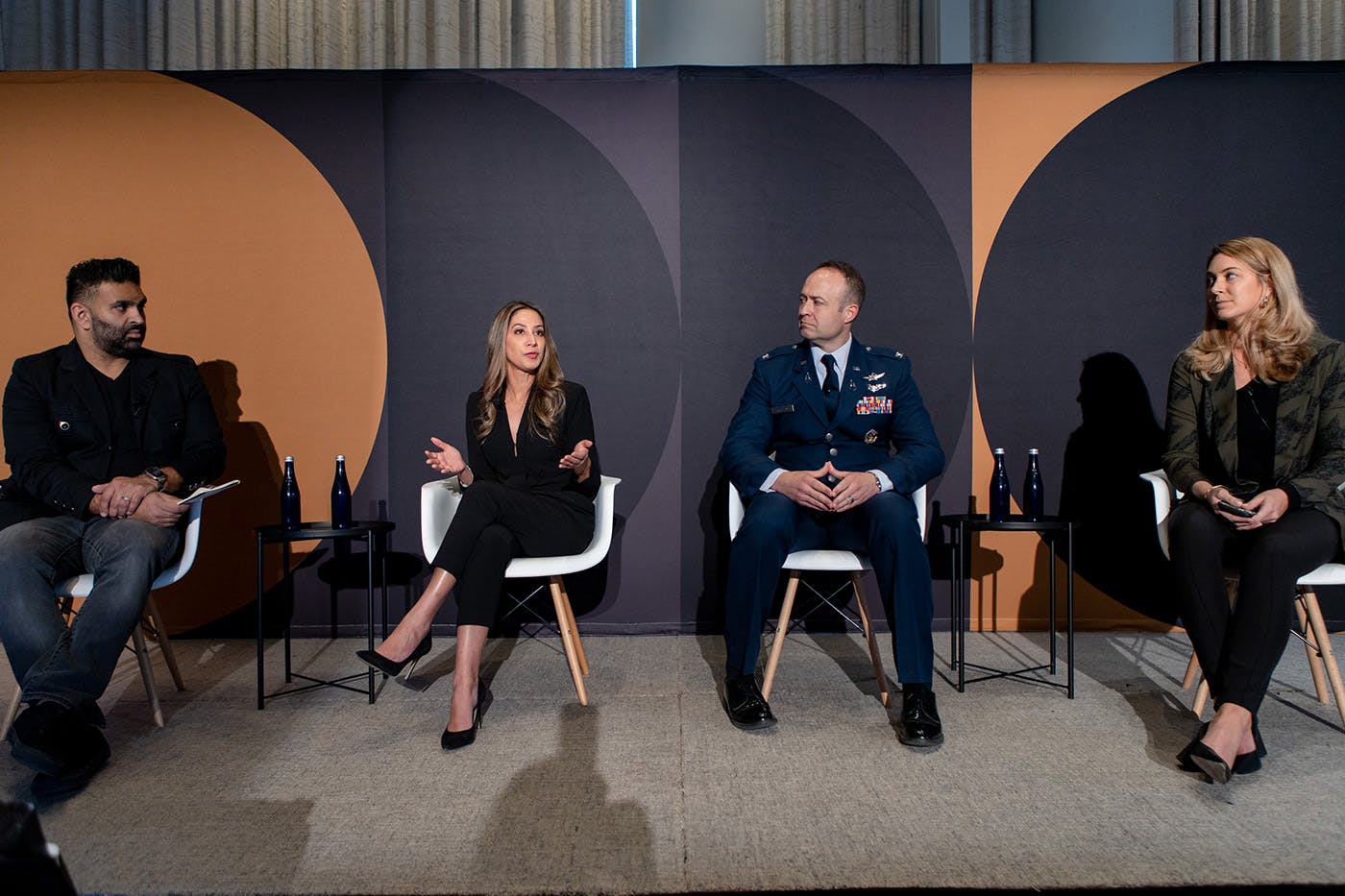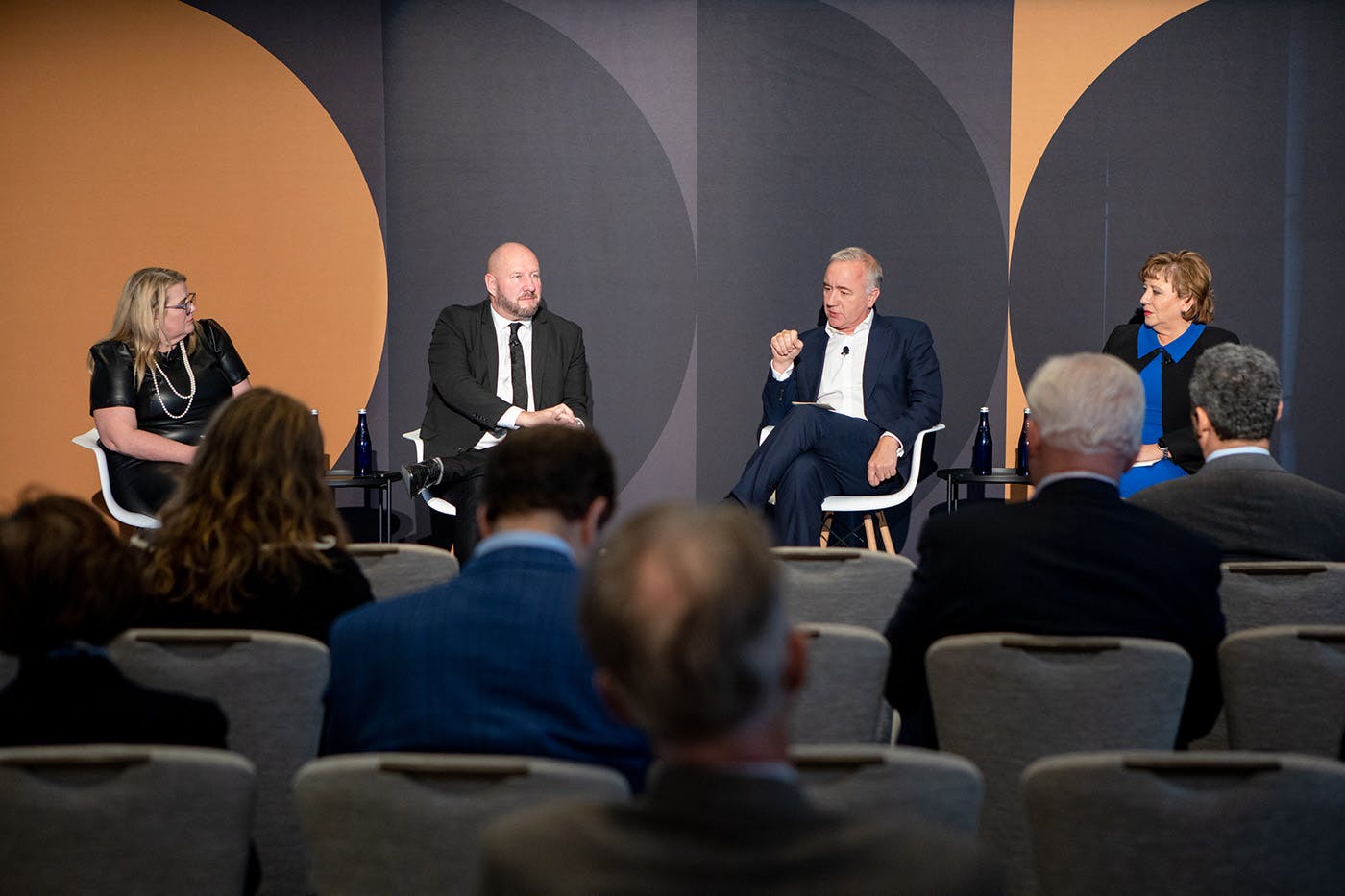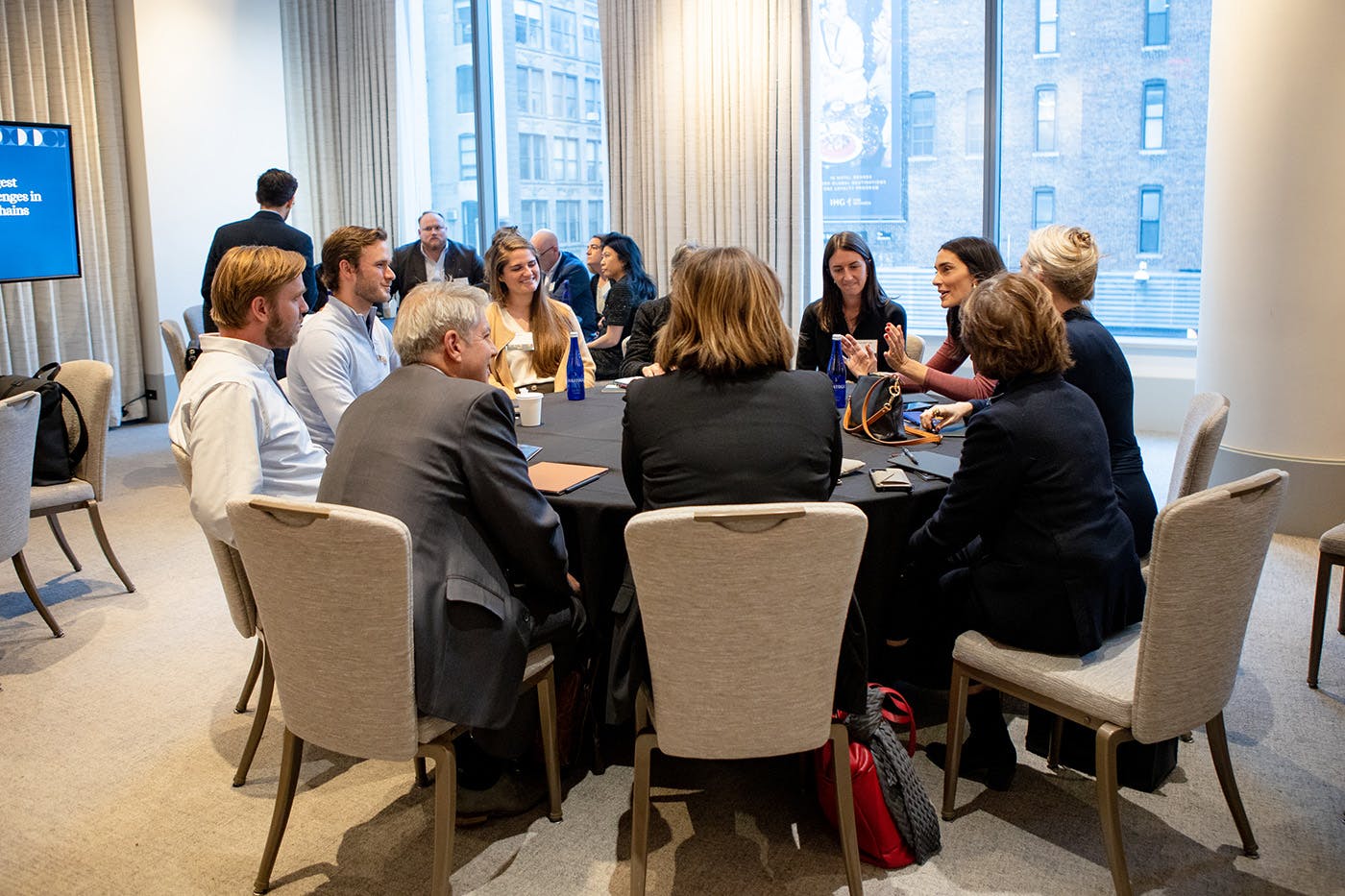Directions, The Altana Summit: Navigating the Future of Supply Chains

Altana was founded five years ago on a thesis that global dislocation to supply chains was not only possible, but probable, and that the public and private sector would need a common operating picture on the global supply chain in order to respond. The last five years have borne this prediction out: first, the pandemic upended the normal patterns of life and trade, and supply chains are being remade with resilience, not cost, as a primary factor. But it’s not just the pandemic. Great power conflict has returned. Climate shocks are increasing in scale and frequency. These disruptions are stressing the global supply chains that we depend on for our common prosperity, our security, and our very lives.
Altana’s work with leaders across government, technology, industry, and logistics have brought us face to face with the disparate challenges and needs among these communities. This November, we had the privilege of bringing these stakeholders together in our hometown of New York City for the second Altana Directions Summit.
In addition to bringing together our existing community, we were pleased to help facilitate new partnerships, bridging the public-private sector divide and connecting new and existing customers to collaborate and learn from each other. And we unveiled a new partnership of our own, announcing a strategic partnership with Dataminr to bring real-time global event monitoring - think tornadoes, accidents, port congestion, business failures, and more - into our dynamic, intelligent map of the global supply chain.
Directions offered robust – and, at times, very frank – conversation between trailblazers in technology, leaders in government, and veterans of the world of trade and supply chains.
Here's what we learned:
The world is fractured, and getting more so.

“We govern by leadership or by crisis. [...] If the United States isn’t a world leader, nobody else will be. If we get back to this fantasy that we can withdraw from the world, then American leadership will weaken, and autocrats will take advantage of that.” - Leon Panetta
To kick off the day, Altana Chief Marketing Officer and former White House Senior Advisor Jonathan Prince sat down with former Secretary of Defense and CIA Director Leon Panetta for a discussion of the major challenges of our time, centering on the national security threats posed by the return of great power competition, fractured diplomatic and trade systems, a persistent terrorist threat, and dizzying technological change. Secretary Panetta painted a picture of a world “more dangerous than any time since the end of World War II,” with revanchist autocracies challenging the material and political progress of the last twenty years. But at the same time, Secretary Panetta highlighted the enduring strengths of the United States – its technological edge, and its ability to form meaningful partnerships.
“The one thing Putin and Xi don’t do well is build alliances. We do.” - Leon Panetta
Secretary Panetta noted that the world is in a “pivotal moment.” But far from heralding the end of globalization, this calls for a new, younger generation of American leaders willing to work hand in hand with a community of like-minded allies. By focusing on areas of common interest - including trade, climate change, and technology - the United States can lead the world through this dangerous moment toward common prosperity.
Geopolitical competition is driving policy and regulatory responses by governments that are bringing the public and private sectors into deeper partnership in governing supply chains.
The challenges highlighted by Secretary Panetta were echoed throughout the day. The afternoon drew a focused discussion on public-private partnerships in the defense sector and space industries, featuring Altana’s VP of Federal, Erringer Helbling, Col. Richard Kniseley of the US Space Force, and Suzanne Dang of Relativity Space. In a conversation moderated by The Verge Editor-in-Chief Nilay Patel, panelists discussed the challenges of ensuring resilient supply chains in the critical area of space systems, where private suppliers form a crucial, and often underappreciated, part of US national security.
Space systems lack a margin for error: even small disruptions to individual parts of the supply chain, whether under public or private sector control, can jeopardize critical national security missions. For Col. Kniseley, the solution lies in creating systems that can enable industry actors, as well as the government, to seamlessly share information on supply chain visibility, availability, and risks.

“As a private company, we think we have a domestic supply base [...] but even though we may not buy from Russian suppliers, we have no idea where the first tier vendors are getting their supply [...] If we had the ability to look into our second and third tier suppliers, we could start to identify the risk. We have to be knowledgeable and armed with all that information.” - Suzanne Dang
A separate panel on the future of trusted trader programs touched on many of the same themes, as Cindy Allen of Trade Force Multiplier moderated a conversation between Ana Hinojosa, former US Customs and Border Protection (CPB) and World Customs Organization (WCO), Lars Karlsson (Maersk and former WCO) and Jim Townsend (former Chief Procurement Officer, Walgreens-Boots Alliance) on the future of trusted trade. While government trusted trader programs have historically been focused on qualifying individual traders for trade facilitation, the new paradigm will require the public and private sector to share visibility across entire value chain networks in this new regulatory paradigm.
Increasingly, firms need to adopt better information-sharing strategies in the face of legislation that requires them to know and police their multi-tier supply chains. As regulations such as the Uyghur Forced Labor Prevention Act and the EU’s Carbon Border Adjustment Mechanism and Corporate Sustainability Due Diligence Directive come online, panelists emphasized that trusted traders and large economic operators can reap benefits by turning multi-tier value chain visibility into enhanced trust with governments – and therefore into faster customs processing times, fewer delays and inspections, and more satisfaction among customers.

“We’re moving from a static approach to assessing vendors and vendor risk much more toward something like continuous monitoring. We’re seeing that in the Altana product, and we see that in terms of the “boots on the ground” assessing risk throughout the supply chain.” - Jim Townsend
Legal and technological innovation will be required to turn supply chains from an operational function into centers of insight and strategic leverage.
But serious obstacles to information sharing among firms and the government persist. In a session that traversed the evolution of data-sharing during the War on Terrorism, Jeremy Bash, former Chief of Staff of the CIA and the Department of Defense; Alan Bersin, former Commissioner of US CBP; and Christopher Fussell, President of the McChrystal Group and former Navy SEAL, discussed how the fragmented, stovepiped supply chain information environment parallels that of the US counterterrorism community in the immediate aftermath of 9-11. As the global war on terror progressed, the US and its allies developed effective ways to better share information, especially in tactical contexts. More recently, the application of AI has enabled information on threats to flow more seamlessly between government and private sector partners.

“Most of the information that’s actually relevant to solving national security problems resides outside of government circles. Gaining access to that, building trust between the government and private sector, being able to utilize that data without compromising privacy and security security – is really the holy grail.” – Jeremy Bash
But as Bersin pointed out, the forward-leaning data-sharing culture that developed in US counterterrorism over the last twenty years has been slow to appear in the world of supply chains. Even the closest governments are reluctant to share information with one another – let alone across the public and private sectors. Encouraging this type of intelligence sharing is a core focus of Robert Silvers, the Undersecretary for Policy at the US Department of Homeland Security. In a discussion with Altana CEO Evan Smith, Silvers highlighted ways in which his department is using AI to combat fentanyl trafficking, interdict forced labor, improve airport screening, and enhance the resilience of American supply chains. In their discussion, Smith and Silvers pointed out that a coming wave of supply chain regulation – in the United States, Europe, and elsewhere – is increasingly making it important that governments and the private sector share information and operate from a common operating picture. Indeed, building on the success of implementing the Uyghur Forced Labor Prevention Act (UFLPA), Silvers emphasized that international standard-setting and private sector information-sharing will be two key priorities for 2024.

“We are going to be very aggressive and avid users of artificial intelligence in our department, because the problems that we are charged with addressing require it. We have to interdict fentanyl [...] we have our forced labor mission [...] and the demands of airport screening. We’re going to lean in on those things. We’re going to do it responsibly, and we have already issued guidelines on safe and responsible use of this technology to protect people’s privacy and their civil rights.” – Rob Silvers
Creating community is at the core of solving our supply chain challenges.
For all the keynotes and speeches, the most rewarding part of Directions didn’t feature on the agenda. Instead, it was the spontaneous conversations, chance connections, and spirited arguments that took place off-script in the corridors and outside of the main sessions. Directions brought together elite thinkers and practitioners from the worlds of government, technology, supply chain, and financial services for a day focused on common challenges – and potential solutions.
In a series of salon sessions designed to provide deep dives and debates on issues of climate change, artificial intelligence, and trade compliance, our community came ready for constructive debate. Rather than speaking, we listened as the assembled experts proposed and weighed solutions to some of the toughest issues of our time.

Altana was also delighted to announce a new addition to our community, as we launched a strategic partnership with Dataminr to bring real-time global event alerting into our map of the global supply chain. This offering will help Altana customers understand not only where they fit in the map of the global supply chain, but also what types of events might threaten their operations - or create opportunity.

For Altana, Directions is more than just a conference - it is a chance for us to set our own compass for the year ahead, taking stock of the challenges our partners are facing, and providing a forum for finding common solutions. Directions 2023 may be over – but as ever, the work is just beginning.
Missed the Directions Summit? Content from this year’s program is now available:
Welcome to Directions
You Need a Map
Global Politics, Global Commerce, Global Change
Achieving Security Through Sharing
Prosperity Through Compliance
The Future of Trusted Trade Networks
Resilient Infrastructure in a Fast-Paced World
Finding Our Bearings
